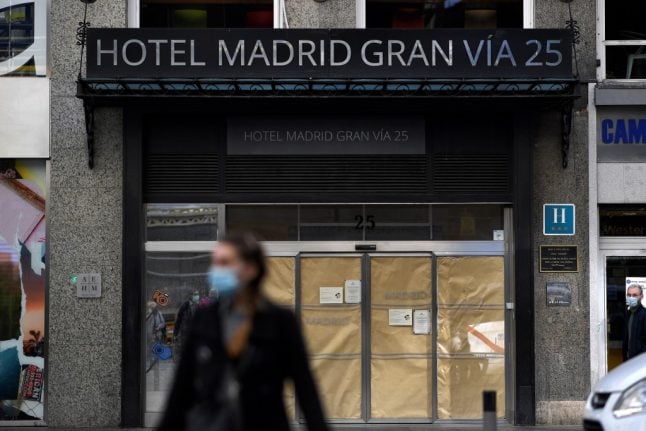The two regions together account for around 40 percent of Spain's economic output and are home to most of the country's big firms, as well as the pillars of its economy such as tourism and the manufacturing sector.
“We will die of hunger,” hundreds of restaurant operators chanted during a protest Friday in Catalan capital Barcelona against a 15-day shutdown of bars and restaurants to contain a surge in cases in the northeastern region.

The measure was introduced shortly after a partial lockdown was imposed in Madrid and several of its satellite towns early October to curb a second wave of the virus in Spain, where nearly 34,000 people have died and about 975,000 have been infected.
Madrid residents can only leave city limits for essential reasons linked to work, school or healthcare, while opening hours and the capacity of bars and restaurants have been reduced.
If the restrictions are maintained for long in the two regions, it will have “a very negative impact” on the economy, Inigo Fernandez de Mesa, the deputy chief of business lobby group CEOE, told AFP.
The current situation corresponds with the group's more pessimistic forecasts at the start of the pandemic in March, predicting this year's gross domestic product would drop between 13 and 14 percent.
The government has also downgraded its forecast and now sees the Spanish economy, the eurozone's fourth largest, falling 11.2 percent in 2020, compared with an earlier forecast in April of 9.2 percent.
The International Monetary Fund meanwhile predicts Spain's tourism-dependent economy will fall by 12.8 percent this year, the worst performance of any Western nation.
Business closures
In Catalonia, the forced closure of bars and restaurants will cost the food service sector €780 million ($913 million), according to Pimec, a Catalan business chamber.
In Madrid, 70 percent of the city's hotels are shut and some 15,000 companies have closed down since the start of the pandemic, according to local business associations.
Madrid's landmark Gran Via boulevard, home to the city's first skyscraper, is already showing signs of the economic pain.
About a third of its businesses, including half a dozen major hotels and several bars and restaurants, are closed, according to a study by newspaper El Pais.
Around 100,000 businesses have closed nationwide, the CEOE says.
But the real damage will come once the government ends measures to prop up the economy, such as credit lines for businesses and a furlough scheme for workers.
These measures “help a lot… but they can't last forever,” admitted Fernandez de Mesa.
'Erratic decisions'
After a catastrophic summer for tourism, the fresh virus restrictions announced in October have sparked a backlash from businesses.
“Companies are suffering the consequences of erratic decisions based on the hibernation of the economy, which have failed to control the pandemic or avoid the loss of jobs,” Madrid business confederation CEIM said in a statement.

Businesses argue that people will be less exposed to the virus in shops and restaurants because of the health protocols that have been put in place such as the mandatory use of masks.
“A business is the safest place because measures have been taken and they are respected. Where there is a risk is at the weekend” at small private gatherings, the head of Spain's small trade federation, Julian Ruiz, told newspaper El Mundo.
Some indicators, such as credit card use, point to a “reactivation” of the economy, according to Economy Minister Nadia Calvino.
“The impact is more from the uncertainty people feel than from the restriction on mobility,” she added in a radio interview on Monday.
Spain will receive 140 billion euros ($165 billion) in grants and loans from a European Union recovery fund, the most of any country after Italy.
By AFP's Emmanuelle Michel
READ ALSO:



 Please whitelist us to continue reading.
Please whitelist us to continue reading.
Member comments